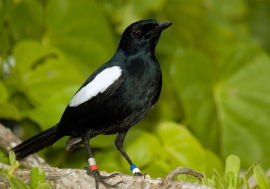‘A lot of reasons to be optimistic’
‘A lot of reasons to be optimistic’
When African countries first attained their independence, most of their trade was with their former colonial powers, and most of their financial assistance came from there. Fifty years later, how much more independent are African economies?
This is one of the more sensitive parts of the evaluation of African independence. In the political field a lot of progress has been made since the 1960s. All African countries have gained independence, either through liberation struggles or through a negotiated process.
But the sensitive part lies with the social and economic progress. Intra-African trade represents a dismal 9 per cent of the overall trade of Africa with the international community. And Africa’s trade represents only 3 per cent of global trade. We have not made progress in that area. Africa has even lost ground because the values of Africa’s commodities have dropped since independence. The prices of commodities are not fixed by Africans themselves. They are fixed elsewhere.
The financial system has not been developed in a way that allows the integration of Africa into the international financial mechanisms. Africa’s financial transactions represent a dismal 0.87 per cent of global financial transactions, which is nothing.
This lack of economic progress has its social implications. In the [UN Development Programme’s annual] Human Development Report, you will see that among the 20 countries which have performed the least in terms of human development, most are African countries.
The current situation has many origins. There is the lack of diversification of the economy. Although these countries are commodity producers, they don’t process the commodities. All the value that is added to these commodities is added elsewhere. And there is a lack of any kind of link between the extractive industries that prevail in many countries and the rest of the economy. So there is no spill-over effect.
On average 80 per cent of the workforce is in the rural areas. Although they spend the whole year working, they produce only a fraction of what a farmer in Europe or America produces on the same size of land, because they don’t have fertilizer or the seed quality is not good or they simply don’t have the know-how to produce better.
And infrastructure is lacking. Be it information and communication technology, roads and railways or whatever, infrastructure is missing.
But there are a lot of reasons to be optimistic about Africa. The first one is the human capital that Africa has. Africa has reached a billion people. The young population represents a minimum of 60 per cent. These young people are yearning for exactly the same well-being as anybody else on the face of this planet. African young people have been trained in the best universities around the world. Africa just has to develop policies to retain them, to create a suitable environment for them to stay home and help build Africa.
The natural resources, thank God, are still there. Now we have to develop intelligent policies for sharing in the value-added. We have to create a legal environment to attract more business, and to lean less and less on official development assistance.
So a few things have to be done: adjustment of institutions, creation of infrastructure, good policies. But what we need more is good leaders. Once we have good leaders, the young people will follow.
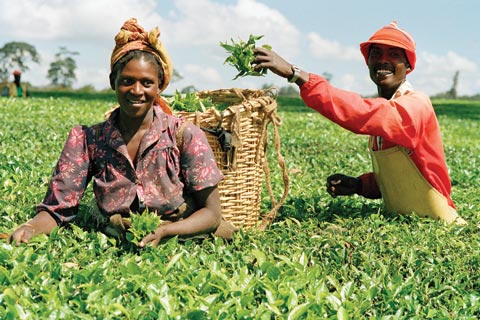 For agriculture — the mainstay of most African economies — to become more sustainable and productive, governments should devote at least 10 per cent of their budgets to the sector, argue proponents of NEPAD.
For agriculture — the mainstay of most African economies — to become more sustainable and productive, governments should devote at least 10 per cent of their budgets to the sector, argue proponents of NEPAD.For decades after independence, the economic policies pursued by African countries generally came from the outside. To what extent does the New Partnership for Africa’s Development (NEPAD), designed by African leaders, represent a break with this pattern?
The first break is ownership, with its corollary, the sense of responsibility. As long as the international community was developing programmes for Africa, sometimes without even substantive input from African countries, they didn’t have much result. The situation even worsened, leading us to structural adjustment in the 1990s.
The advantage of NEPAD is that its ownership is with African leaders themselves. If they fail, it will be their own responsibility. If they succeed, which I wish, it will be praised and supported by the international community.
Africans are rolling out sectoral policies and specific sectoral projects. For example, on agriculture. They know how to make sustainable, productive agriculture. The rate of growth of agriculture should be a minimum of 6 per cent on a yearly basis. There should be an investment of 10 per cent of the national budget in agriculture. The goals are there. The means have been identified. Now they’re moving from the stage of continental projects to country specifics. That has brought the NEPAD Planning and Coordinating Agency to have compacts with individual African countries, a commitment that the government makes on a voluntary basis on agriculture.
They are doing exactly the same thing in health. They are doing exactly the same thing in infrastructure. This is good, because it is concrete.
NEPAD priorities are inspired by the Millennium Development Goals. When you bring these two together, you have something very strong, a programme that has been initiated by African countries, but also supported by the United Nations. So at least at the policy level, there has been a change. It’s home grown and fully conceived by African leaders.
Could you reflect on what Africa has learned about the kind of leadership it needs?
There are three types of leadership that Africa has known. The first was the “fathers of independence.” Their role was to keep the nation together, because most African countries are multi-ethnic. Community, tribes, ethnic groups sometimes prevailed above the notion of nation. So they gave themselves the responsibility to consolidate territorial integrity, nation building. They did what they had to do: consolidate national integrity and push forward the agenda for the independence of the rest of the African colonies.
The second group of leaders are those who have come to power by infringing national constitutions and taking advantage of the social discontent that the structural adjustment programmes provoked. Most of the time, these people are military. History has demonstrated that almost all of them have failed, because the rule of law didn’t prevail, human rights were not protected, the basic principles of democracy did not prevail and most of them were simply corrupt.
Then there is a third generation of leaders. This is a new generation that is coming up in some African countries. They have vision. They are young. They are strong. And they know how to mobilize their people. I will not name any, because I would make the others very jealous. Actually, I will name one, who is not in power anymore: Alpha Oumar Konaré [former president of Mali and former chairman of the African Union Commission].
They have vision. They have aspirations for their people. They need to be supported, to show that good leadership pays. They need strong support from the international community.
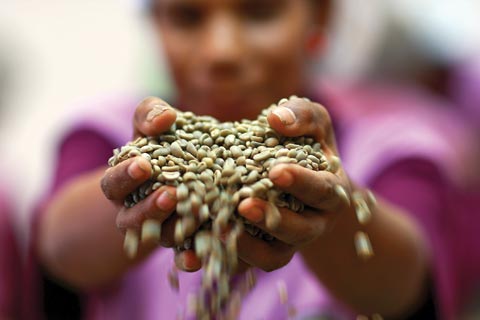 Coffee beans, one of Africa’s export crops: “The values of Africa’s commodities have dropped since independence.”
Coffee beans, one of Africa’s export crops: “The values of Africa’s commodities have dropped since independence.”On the international community, how can it better support Africa?
There is just one thing. The rest of the world has to change its perception of Africa. It has to see Africa not only as a continent which is forever leaning on international aid and support. It has to see Africa as a continent of huge potential.
In the 1970s, if you remember, China was seen as a threat to the rest of the world. But the leadership of China in the 1980s succeeded in changing the paradigm. From China being seen as the threat of communism, people have started to discover China as a potential market for consumption, for production. Slowly, but surely, investors have changed their perception and attitude, and see China as a land of opportunity and potential.
This needs to happen in Africa. To not see Africa only as a burden, but to see Africa as a potential: consumers, good producers, of commodities but also possible transformation and processing.
Any concluding words?
These 50 years of independence are very short in the life of a nation. But it’s good enough to make an assessment of where we have come from, where we are right now and where we want to go.
Never before have we had such an opportunity to influence what is happening internationally. We have the chance to create suitable environments for business. We have the chance to give to each African individual the dignity and respect he deserves. We have a chance to have a vision. Now is the time to seize this opportunity.

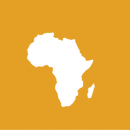
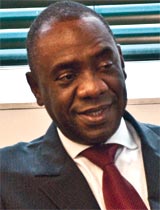 Photograph: UN Africa Renewal / Marlene Tremblay-Gervais
Photograph: UN Africa Renewal / Marlene Tremblay-Gervais












